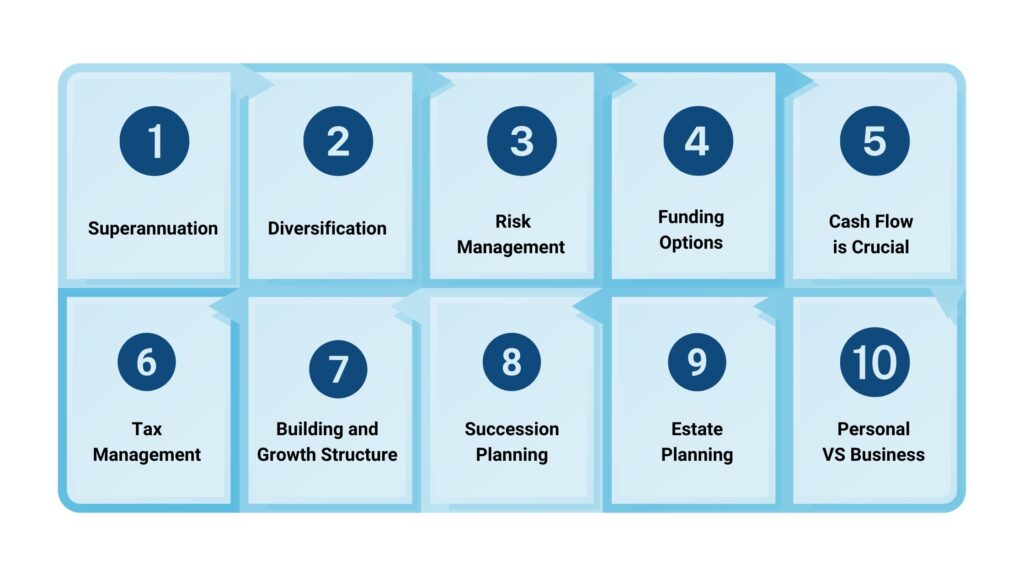Establishing a business can be both an exhilarating and overwhelming experience. It’s easy to get caught up in the exciting details of launching your new venture: hiring employees, setting up your website and office space, making sales — not to mention all the associated paperwork.
Whilst it’s tempting to devote the lion’s share of time and effort to the various roles and responsibilities involved in business, from developing your product or service, hiring the right people and finding customers, through to marketing and more, it’s equally as important to carve out time to tend to the financial health of the business and yourself.
In fact, given the fact that small business owners in Australia play a vital role in fuelling the country’s economic growth, contributing significantly to the GDP and employment rates, ensuring the financial success of your business and self, is crucial.
How to achieve financial health for your business and future?
So, when over 60% of small businesses face financial challenges stemming from poor financial management practices, bad wealth management advice, overwhelming debts and other factors*, how can you work towards ensuring the financial health of your business and your future?
First and foremost, it’s important to acknowledge that financial planning for business owners varies from the needs of individual advice in numerous ways such as:
- It entails the development of a well-structured long-term strategy for your business that takes both short and long-term factors into consideration, from raising capital to funding equipment, through to loans for general expenses;
- It needs to help you determine where you want your business to be in a couple of years’ time; and
- It should incorporate the unpredictability of running a business and have a financial plan in place that helps you simultaneously manage your personal finances whilst preparing for potential challenges and setbacks.
Whilst financial planning for business owners does differ, there is one fundamental factor that is common across the board for all; that financial planning is about managing your money in a way that helps you reach your financial goals, no matter the circumstances or challenges, along the way.
Therefore, the integration of business and personal financial planning is essential for business owners as a well-structured financial plan will not only consider the business’s financial aspects but will also examine personal assets, liabilities and financial goals.
The 10 financial factors every business owner needs to know
This whitepaper will delve into both the personal and business financial landscape to uncover the 10 factors you need to consider, as a business owner, when planning for your overall financial health now and in the future. In part one of this five-part series we will look at the importance superannuation and diversification.

1. Superannuation
According to Australian Super Funds Association (ASFA), over 20% of small business owners have no superannuation, a statistic that is perhaps unsurprising given the raft of monetary obligations involved in maintaining a business.
After all, it’s quite easy to delay or forgo contributing to your own super when you need to pay staff, suppliers and other parties, as well as pay for operating expenses every month. However, the stark reality is working for yourself means that you are the only one who can contribute to your super, so it’s important not to push yourself and your financial future, off the priority list.
In many cases, business owners choose to forsake contributing to their own super as they invest every single spare dollar into the business, in the hope that the proceeds of its future sale will fund their desired retirement and secure their financial future. However, relying on the sale of your business for retirement is not a comprehensive strategy and can be risky. You may not be able to sell when you like or the business may not be worth what you are expecting, especially without you as the operator.
Regardless of the type of business you’re in, what stage of life you’re at or how long the timeline to your retirement, it’s imperative you consider contributing to your superannuation today to create the tomorrow you deserve.
Plus, making contributions to your superannuation can assist with tax minimization as some contributions are taxed at a lower rate when compared with your personal income.
2. Diversification
Business owners can often become heavily invested in their business, causing them to overlook the importance of diversifying across various investments, uncorrelated with their enterprise. This can expose you to higher risk and lessen long-term returns.
Reinvesting in your business
Whilst it’s important to diversify your investments, ensuring you reinvest in your business has a multitude of benefits including: it can significantly increase net profits, accelerate profit growth and reduce risk as the extra capital decreases or eliminates the need for external borrowing. Reallocating profits and other resources back into your business isn’t about wasting money on unnecessary expenses, but applying resources in a strategic manner that can result in higher profits and help you to reach your long-term goals of continued growth and success. If you want to build a big, profitable, and valuable business then reinvestment of profits should be considered as part of your overall investment strategy.
Although it’s human nature to stick with what you know and are comfortable with, the opposite is true when it pertains to investing, here, diversification is key.
Diversifying your investment portfolio is imperative for long-term financial growth and security. A well-diversified investment portfolio contains a balance of growth and value stocks to help you accomplish your investment goals over the short, medium and long-term.
Diversification can also reduce your portfolio’s risk without sacrificing the performance of your portfolio. It is the process of investing in a mix of asset classes, industries, geographic regions and more in order to minimise the impact of one of the investments performing poorly.
Here at Profile Financial Services, we can help you grow your wealth with a diversified investment portfolio that is tailored to your unique goals and timeframe.
Stay tuned for more!
Join us for the second instalment of Decoding Financial Success for Business Owners: The 10 Factors You Need To Know when we discuss risk management and explore the various funding options available to support the growth of your business.






